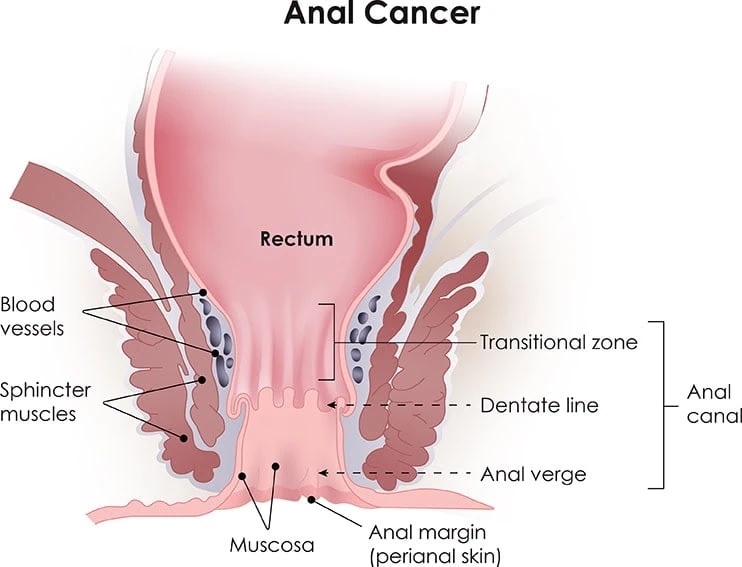
Anal Cancer
What is Anal Cancer?
Anal cancer is a rare tumour with an incidence that has been increasing over the past 25 years. Worldwide, approximately 54,000 cases were diagnosed in 2022, accounting for less than 5% of gastrointestinal tract malignancies (Young et al., 2020).
Diagnosing anal canal cancer can be challenging, as its symptoms often resemble those of benign anorectal conditions. It is an uncommon yet highly stigmatised disease, frequently linked to late presentation, stage migration, and the escalation of treatment.
Anatomy of the anus
The anal canal extends from the perianal skin at the end of the anus (anal verge) to the rectal mucosa. An important landmark within the canal is the dentate line, a transitional boundary that marks the end of the squamous mucosa and the beginning of a zone transitioning from squamous to non-squamous epithelium. This region is particularly prone to developing anal cancer (Young et al., 2020).
Types of anal cancer
Anal cancer can develop from different types of cells within the anal canal and surrounding tissues:
Squamous cell carcinoma (SCC): the most common type, accounting for approximately 85% of cases. It arises from the squamous cells lining the anal canal and is often associated with HPV infection.
Adenocarcinoma: much less common than SCC (around 5-15% of cases). It develops from mucus-producing glandular cells in the anal or lower rectum region.
Other rare types: including anal melanoma (arises from pigment-producing cells in the anal canal), basal cell carcinoma (develops in the perianal skin surrounding the anus), small cell carcinoma (arises from neuroendocrine cells in the anal region), gastrointestinal stromal tumours (GISTs, a type of soft tissue sarcoma), or lymphoma (originates in lymphatic tissue within the anal region).
Literature
1. Young, A. N., Jacob, E., Willauer, P., Smucker, L., Monzon, R., & Oceguera, L. (2020). Anal Cancer. The Surgical clinics of North America, 100(3), 629–634. https://doi.org/10.1016/j.suc.2020.02.007
2. Wong, J., Allwright, M., Hruby, G., Roberts, J. M., Carr, A., Jin, F., … & Co-authors. (2023). Anal cancer: A 20-year retrospective study from Australia. ANZ Journal of Surgery. https://doi.org/10.1111/ans.18586
3. Rao, S., Guren, M. G., Khan, K., Brown, G., Renehan, A. G., Steigen, S. E., Deutsch, E., Martinelli, E., & Arnold, D. (2021). Anal cancer: ESMO clinical practice guidelines for diagnosis, treatment, and follow-up. Annals of Oncology, 32(9), 1087–1100. https://doi.org/10.1016/j.annonc.2021.06.003
